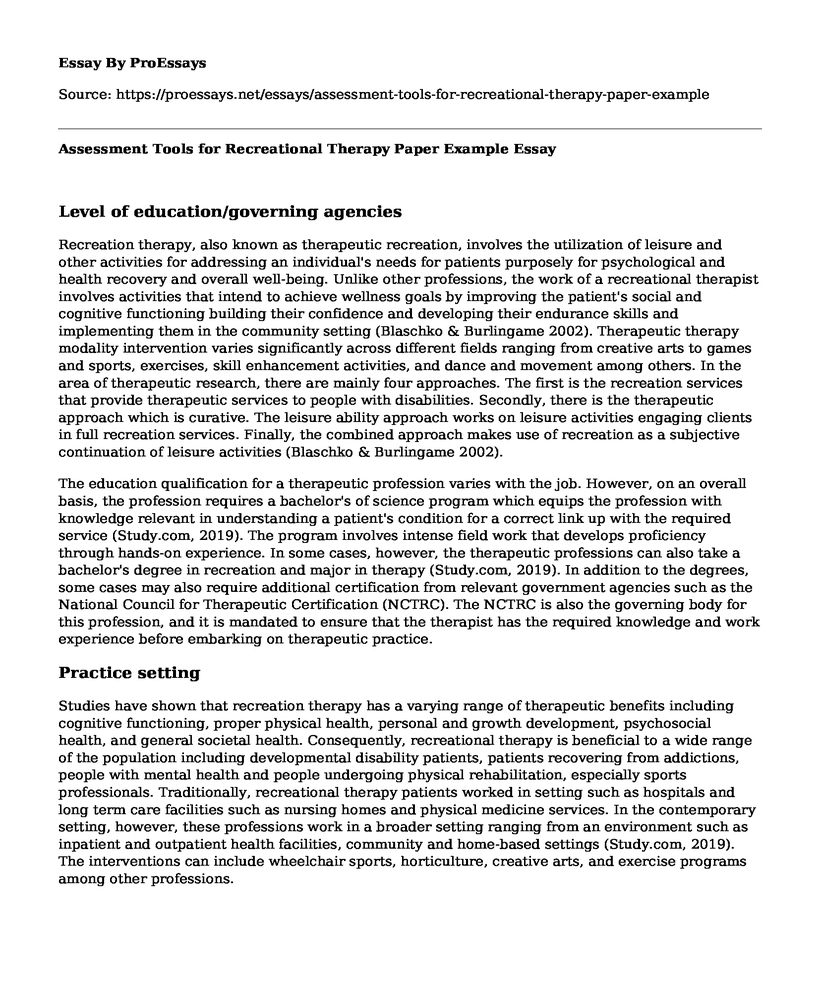Level of education/governing agencies
Recreation therapy, also known as therapeutic recreation, involves the utilization of leisure and other activities for addressing an individual's needs for patients purposely for psychological and health recovery and overall well-being. Unlike other professions, the work of a recreational therapist involves activities that intend to achieve wellness goals by improving the patient's social and cognitive functioning building their confidence and developing their endurance skills and implementing them in the community setting (Blaschko & Burlingame 2002). Therapeutic therapy modality intervention varies significantly across different fields ranging from creative arts to games and sports, exercises, skill enhancement activities, and dance and movement among others. In the area of therapeutic research, there are mainly four approaches. The first is the recreation services that provide therapeutic services to people with disabilities. Secondly, there is the therapeutic approach which is curative. The leisure ability approach works on leisure activities engaging clients in full recreation services. Finally, the combined approach makes use of recreation as a subjective continuation of leisure activities (Blaschko & Burlingame 2002).
The education qualification for a therapeutic profession varies with the job. However, on an overall basis, the profession requires a bachelor's of science program which equips the profession with knowledge relevant in understanding a patient's condition for a correct link up with the required service (Study.com, 2019). The program involves intense field work that develops proficiency through hands-on experience. In some cases, however, the therapeutic professions can also take a bachelor's degree in recreation and major in therapy (Study.com, 2019). In addition to the degrees, some cases may also require additional certification from relevant government agencies such as the National Council for Therapeutic Certification (NCTRC). The NCTRC is also the governing body for this profession, and it is mandated to ensure that the therapist has the required knowledge and work experience before embarking on therapeutic practice.
Practice setting
Studies have shown that recreation therapy has a varying range of therapeutic benefits including cognitive functioning, proper physical health, personal and growth development, psychosocial health, and general societal health. Consequently, recreational therapy is beneficial to a wide range of the population including developmental disability patients, patients recovering from addictions, people with mental health and people undergoing physical rehabilitation, especially sports professionals. Traditionally, recreational therapy patients worked in setting such as hospitals and long term care facilities such as nursing homes and physical medicine services. In the contemporary setting, however, these professions work in a broader setting ranging from an environment such as inpatient and outpatient health facilities, community and home-based settings (Study.com, 2019). The interventions can include wheelchair sports, horticulture, creative arts, and exercise programs among other professions.
Employment outlook
According to the Bureau of Labour Statistics' report in 2015, the median income for therapeutic therapist was $45,890 per year (Study.com, 2019). The figure was however set to change due to various factors. According to the report, medical hospitals and surgical centers employed a majority of the therapists. Skilled nursing and care centers followed them. Other areas of practice include government, residential care facilities, and ambulatory care services. Regarding employment growth in the industry, it was predicted that the industry was set to grow by 12% within ten years beginning 2014 (Study.com, 2019).
Recreation therapy involves the employment of various behaviors and competencies. Some of the most common competencies associated with the profession include proper communication, good professional judgment, sound risk management, and excellent problem-solving skills. Additionally, a therapeutic recreational profession should also possess good therapeutic evaluation skills, appropriate therapeutic recreation assessment skills and excellent documentation skills among many others.
References
Blaschko, T. M., & Burlingame, J. (2002). Assessment tools for recreational therapy and related fields. Ravensdale, WA: Idyll Arbor Inc.
Study.com. (2019). Recreation Therapist: Job Description, Duties, and Requirements. Retrieved from https://study.com/articles/Recreation_Therapist_Job_Description_Duties_and_Requirements.html
Cite this page
Assessment Tools for Recreational Therapy Paper Example. (2022, Dec 06). Retrieved from https://proessays.net/essays/assessment-tools-for-recreational-therapy-paper-example
If you are the original author of this essay and no longer wish to have it published on the ProEssays website, please click below to request its removal:
- Course Work Example on Children's Nutrition
- Research Paper on Respiratory Diseases in Older Adults
- CPS Should Do a Lot to Support Student Living With Disabilities - Article Analysis Essay
- Article Analysis Essay on Lifelong Learning Strategies in Nursing: A Systematic Review
- Essay on Hit-and-Run Victim in Emergency Room: Hospital's Emergency Plan to Stop Bleeding and Revive
- Value vs. Knowledge: The Need for Clarity and Understanding - Essay Sample
- Should Euthanasia Be Legalized? An Argumentative Essay Example







